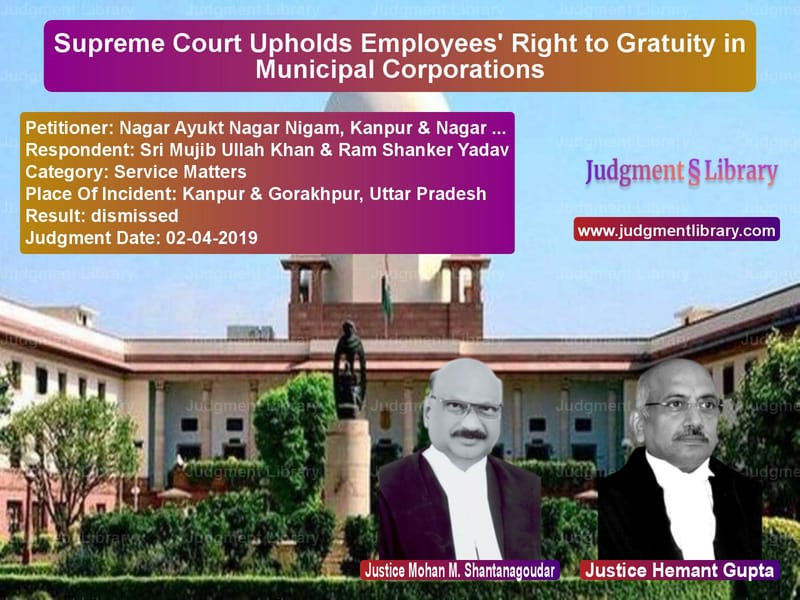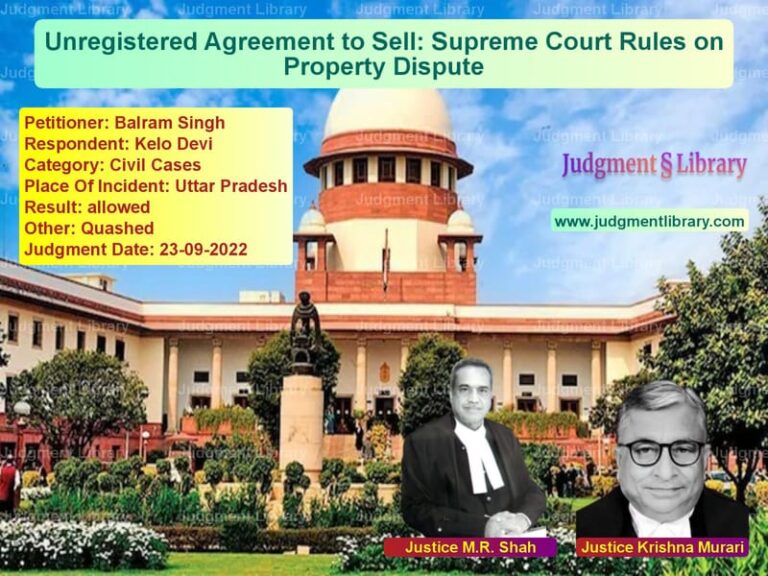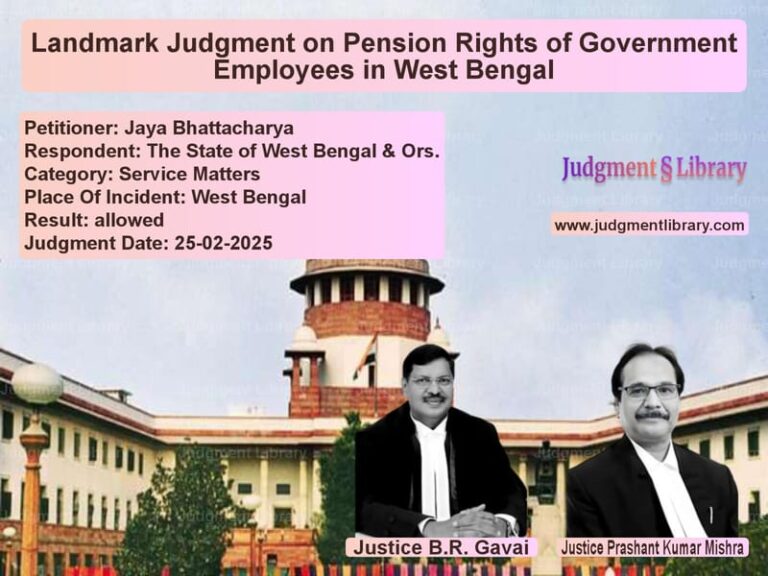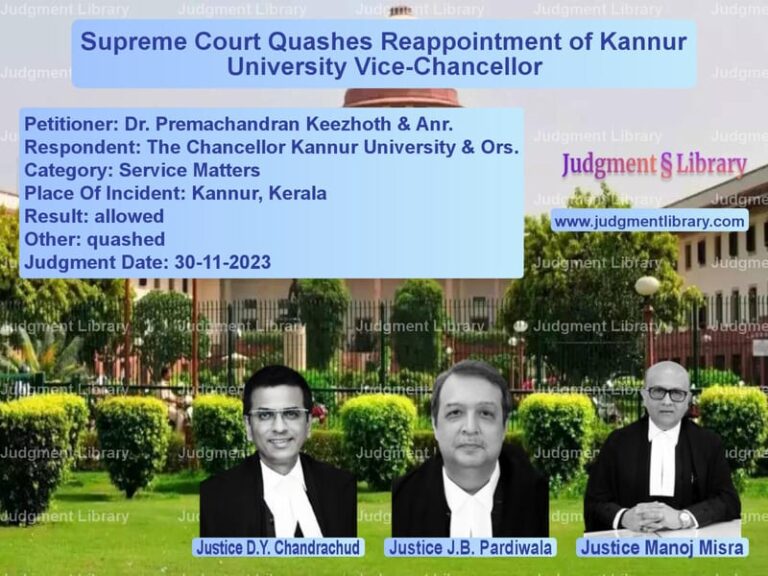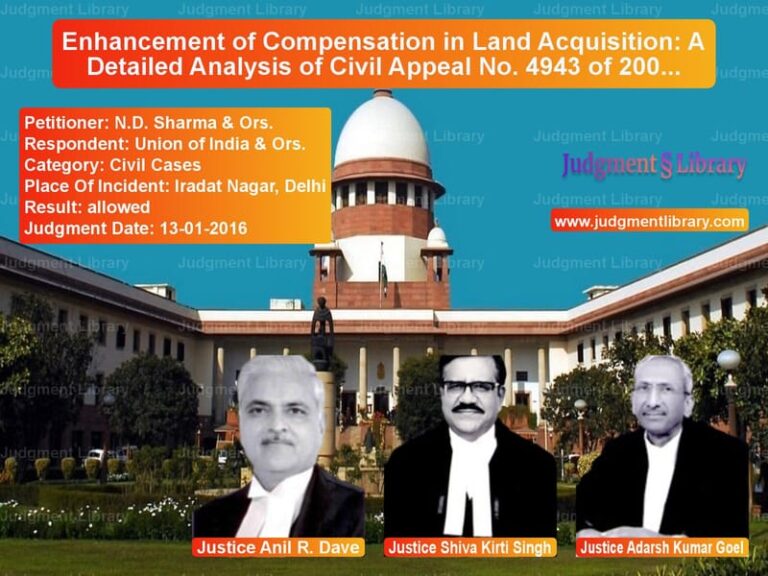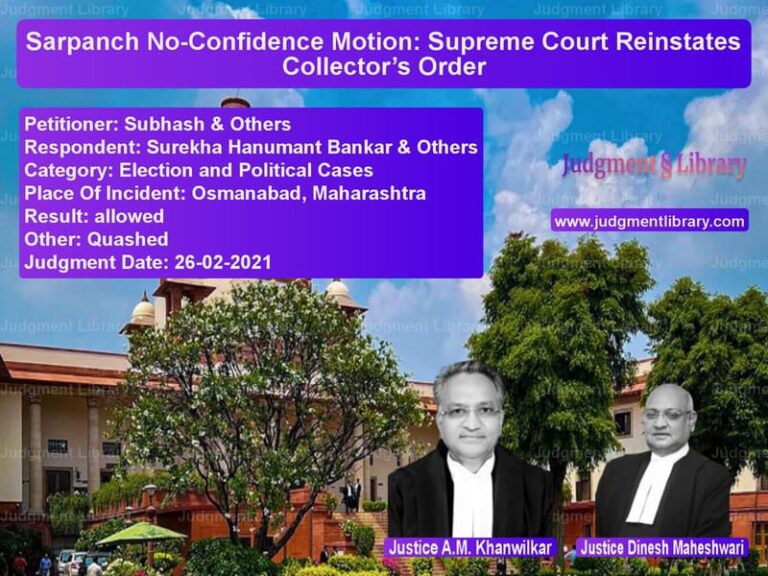Supreme Court Upholds Employees’ Right to Gratuity in Municipal Corporations
The Supreme Court of India, in the case of Nagar Ayukt Nagar Nigam, Kanpur v. Sri Mujib Ullah Khan & Anr. and Nagar Nigam, Gorakhpur v. Ram Shanker Yadav & Anr., upheld the decision of the Allahabad High Court affirming that employees of municipal corporations are entitled to gratuity under the Payment of Gratuity Act, 1972. The Court ruled that state regulations on gratuity, which offered lesser benefits, were overridden by the central legislation.
Background of the Case
The dispute arose when employees of the Kanpur and Gorakhpur municipal corporations claimed gratuity under the Payment of Gratuity Act, 1972 (hereinafter referred to as ‘the Act’). The municipal corporations, however, contended that gratuity for their employees should be paid as per the Retirement Benefits and General Provident Fund Regulations, 1962 (hereinafter referred to as ‘the 1962 Regulations’), framed under the Uttar Pradesh Municipal Corporation Act, 1959. The 1962 Regulations provided for a lower gratuity amount than what was available under the central law.
The Controlling Authorities under the Payment of Gratuity Act allowed the employees’ petitions for gratuity in both cases. The Allahabad High Court upheld these orders, prompting the municipal corporations to appeal before the Supreme Court.
Key Issues Before the Supreme Court
- Whether employees of municipal corporations are covered under the Payment of Gratuity Act, 1972.
- Whether the 1962 Regulations framed under state law can override the provisions of the central legislation.
- Whether the notification issued by the Central Government on 08.01.1982 extending the applicability of the Gratuity Act to local bodies was valid and applicable.
Arguments by the Appellants (Municipal Corporations)
- The appellants contended that municipal corporations are governed by the 1962 Regulations, which provide gratuity benefits at the rate of 15 days’ salary per month for 16.5 months, as per state law.
- They argued that the U.P. Dookan Aur Vanijya Adhishthan Adhiniyam, 1962 explicitly excludes municipal corporations from its applicability.
- They further contended that municipal corporations do not fall under the categories of factories, mines, oilfields, plantations, ports, or railway companies as defined under Section 1(3)(a) of the Gratuity Act.
- There was no specific notification extending the Payment of Gratuity Act to municipal corporations.
Arguments by the Respondents (Employees)
- The respondents argued that municipal corporations are covered under the Central Government’s Notification dated 08.01.1982, which explicitly extended the Act to ‘local bodies’ employing ten or more persons.
- They contended that Section 14 of the Gratuity Act grants it overriding effect over all inconsistent state laws and regulations.
- The Act applies uniformly across India, and its beneficial provisions should be available to all employees, including those in municipal corporations.
- Since the 1962 Regulations provided lesser benefits than the central law, they were invalid in light of Section 14 of the Act.
Supreme Court’s Analysis
The Supreme Court, in its judgment delivered by Justices Mohan M. Shantanagoudar and Hemant Gupta, examined the legal provisions in detail.
1. Applicability of the Payment of Gratuity Act, 1972
The Court emphasized that the Payment of Gratuity Act applies to local bodies, including municipal corporations, due to the notification issued by the Central Government on 08.01.1982.
“The Act applies to every establishment employing ten or more persons, and the notification issued in 1982 has extended its applicability to local bodies, including municipalities.”
2. Overriding Effect of the Central Law
The Court held that Section 14 of the Gratuity Act grants it primacy over any inconsistent state laws or regulations.
“The provisions of the Act shall have effect notwithstanding anything inconsistent contained in any enactment other than this Act or in any contract.”
3. Comparison of Benefits Under State and Central Law
The Court observed that the Gratuity Act provides for gratuity at the rate of 15 days’ wages for each completed year of service, without a cap on months of service. In contrast, the 1962 Regulations limited gratuity to 16.5 months.
“Liberal payment of gratuity is in the interest of employees and should not be curtailed by restrictive state regulations.”
4. Rejection of the Appellants’ Exclusion Argument
The appellants contended that the Act applied only to factories, mines, oilfields, plantations, ports, and railway companies. The Court rejected this argument, stating that Clause (c) of Section 1(3) allows the Central Government to extend the Act’s coverage to other establishments, including municipal corporations.
“The notification issued by the Central Government extending the Act to local bodies leaves no room for ambiguity. Municipal corporations are covered under the Act.”
Final Judgment
The Supreme Court dismissed the appeals, ruling that municipal corporation employees are entitled to gratuity under the Payment of Gratuity Act, 1972. The Court affirmed:
“The appeals lack merit and are accordingly dismissed. Municipal corporation employees shall receive gratuity as per the Act.”
Key Takeaways
- Municipal Corporation Employees Are Covered: The ruling clarifies that municipal corporations fall under the ambit of the Payment of Gratuity Act.
- Central Law Prevails Over State Regulations: The Act has overriding authority over inconsistent state laws or regulations.
- Notification of 1982 Extends the Act’s Applicability: The Court upheld that local bodies are covered under the Gratuity Act.
- More Beneficial Provisions Apply: If two laws provide different benefits, employees are entitled to the more beneficial provisions.
Conclusion
The Supreme Court’s ruling in Nagar Ayukt Nagar Nigam, Kanpur v. Sri Mujib Ullah Khan & Anr. and Nagar Nigam, Gorakhpur v. Ram Shanker Yadav & Anr. ensures that municipal corporation employees are entitled to gratuity under the central legislation. The decision reinforces that central labor laws take precedence over state regulations, guaranteeing better financial security for employees.
Petitioner Name: Nagar Ayukt Nagar Nigam, Kanpur & Nagar Nigam, Gorakhpur.Respondent Name: Sri Mujib Ullah Khan & Ram Shanker Yadav.Judgment By: Justice Mohan M. Shantanagoudar, Justice Hemant Gupta.Place Of Incident: Kanpur & Gorakhpur, Uttar Pradesh.Judgment Date: 02-04-2019.
Don’t miss out on the full details! Download the complete judgment in PDF format below and gain valuable insights instantly!
Download Judgment: Nagar Ayukt Nagar Ni vs Sri Mujib Ullah Khan Supreme Court of India Judgment Dated 02-04-2019.pdf
Direct Downlaod Judgment: Direct downlaod this Judgment
See all petitions in Pension and Gratuity
See all petitions in Public Sector Employees
See all petitions in Judgment by Mohan M. Shantanagoudar
See all petitions in Judgment by Hemant Gupta
See all petitions in dismissed
See all petitions in supreme court of India judgments April 2019
See all petitions in 2019 judgments
See all posts in Service Matters Category
See all allowed petitions in Service Matters Category
See all Dismissed petitions in Service Matters Category
See all partially allowed petitions in Service Matters Category

